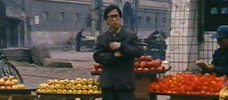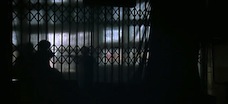Reviews
Er shi si cheng ji
Jia Zhangke
China / Hong Kong / Japan, 2008
Credits
Review by Evan Kindley
Posted on 02 June 2011
Source Cinema Guild DVD
Categories Jia Zhangke’s Migrations
Like Jean-Luc Godard’s 2 or 3 Things I Know About Her, Jia Zhangke’s 24 City is a series of semi-fictional character studies strung on the thread of a municipal construction project. The project in question is the conversion of 420 Factory, a government-owned munitions plant in Chengdu, into a new “modern living community” called 24 City (named for a line in an ancient poem: “The cherished hibiscus of 24 city in full bloom, Chengdu shone and prospered”). Early on we are present at a “ceremony for the transfer of land” witnessed by a vast crowd of workers in blue uniforms, each one uniquely expressive and, thanks to the hyper-real capabilities of digital video, perfectly in focus (one senses that, if Jia had had time, he’d have wanted to spend some time with all of them).
Much of 24 City’s running time is devoted to establishing the viewer’s sense of Chengdu: a task that must have seemed particularly urgent, given that the area was about to be transformed beyond recognition. (This prospective structure suffuses the movie with a strange sense of paradox: 24 City may be one of the few films named for a real place that, at the time of its production, didn’t exist yet.) We get very wide establishing shots of the factory and the surrounding land; shots of the interior, both before and after its emptying; and inserts of material documents that link us to the building’s past, like factory I.D. cards. Jia sets these off with Godardian intertitles: lines from poems by Ouyang Jianghe, Cao Xueqin, Wan Xia, and W.B. Yeats (Jia’s collaborator on the script for 24 City, Zhai Yongming, is a poet herself), and business slogans on the order of “If you have something to do, you age more slowly” and “If the aeronautics factory is like a huge eyeball, the laboring is its pupil.” Music is used sparingly, but the occasional saccharine pop song does pop up. (Ironically or not, it’s a little hard to say, since irony depends, at least in part, on a shared sense of temporality. Are these songs meant to be out of date?)
For a film about a factory, 24 City has a very non-industrial rhythm: the general affect of the characters that populate the movie is that of people who are slightly uncomfortable at rest. But this is fitting, of course, given that Jia’s subject here is the transition from a culture of labor to a culture of leisure, or (in more economic terms) from a production- to a consumption-driven economy. The rhythm is so leisurely, in fact, that it can be hard to pick up; often the subjects speak about nothing in particular for minutes on end before falling sideways into a story. The long unedited takes, with long pauses at the beginning and end of scenes and unexpected black outs, keep us off balance; subjects stare at the camera silently for a long time, as if posing for a still photo.
But the interviews - shot from oblique angles with the speaker usually staring off to the extreme right or left of the frame; often windows give out on the exterior, with street noises audible - are the heart of the film. A former worker describes the tools he used at 420 Factory and speaks respectfully of his supervisor Master Wang; another rides the bus at night and talks about being laid off and the importance of “smiling through your tears” (“Come rain, come shine, you must go forward”). We enter a retired persons’ home, where the elderly play mah jong and sing traditional Chinese opera. We meet Song Weidong, a management type whose offices are being converted into a luxury hotel; he plays basketball on the factory court (soon to be leveled) and reminisces about the death of Chairman Zhao. Hao Dali, an older lady who works in an office, is shocked that her young co-worker wears makeup to work. Zhao Gang, a television news presenter, confesses his own intense experience of boredom with factory work at age 16.
Though each of these interviews is presented in more or less the same fashion, four of them are not in fact straight documentary but filmed monologues by professional actors. (Hao and Song are played by the actors Liping Lu and Jianbing Chen; the rest are “real people.”) Western viewers not familiar with the Chinese film industry will be forgiven for not noticing the difference, at least until we get to Joan Chen (of Twin Peaks and The Last Emperor fame) who plays Gu Minhua, a beautiful middle-aged women who everyone calls “Little Flower,” after the 1979 film starring … a young Joan Chen. This is both the film’s most daringly self-reflexive gesture and one of its most emotionally effective: seeing Chen play her own doppelganger, for whom the charmed life of the movie star never arrived, brings home the cruel randomness of Chinese upward mobility. (In her final appearance, she wistfully watches the movie on television.)
Over the course of its running time, 24 City tracks a gradual historical change in two registers: in the demolition of the old factory (which Jia films from a great distance, the cloud of smoke billowing slowly towards his camera) and in the generational progression of its interviewees. The film begins with the oldest characters and moves forward to the youngest, most of whom are not factory workers themselves but their children. This younger generation is noticeably more Westernized in their dress and frames of reference, and they confess a feeling of distance from their parents and grandparents, however much they may respect their experiences. The apotheosis of this forward movement is the film’s final sequence, featuring a young woman named Su Na (played by the actress and Jia-regular Zhao Tao) who wears her hair short like Jean Seberg in Godard’s Breathless. She went to school in Factory 420 and is now a personal shopper for rich women. Her monologue starts out chatty and casual: “I have a friend from Malaysia,” she says, “I met him on a plane” - a statement that it’s practically impossible to imagine any of the older characters in 24 City uttering. As the light slowly dims behind her, she becomes more and more emotional, revealing that she wants to make money in order to set her aging parents up with an apartment in 24 City.
Just as we’ve come to expect our fiction movies to have plots, we’re growing increasingly used to our documentaries pursuing arguments, be they political, scientific, historical, or moral. Even Godard, whose work 24 City resembles in so many ways, is guilty of this hortatory tendency: when he blends fiction and non-fiction, especially in films from his high Marxist phase like 2 or 3 Things I Know About Her, he aims to convince you twice over, once through drama and once through facts. Jia’s technique here is closer to that of a pure observer like Frederick Wiseman: far from being in a hurry to make a point, he seems to want to slow things down as much as possible, to use class and leisure and labor not as tokens in a ritual exchange or weapons in an attack but as actual objects of contemplation. In an era of hyper-charged production and expansion, this slowness and quietness serve as their own kind of protest.
More Jia Zhangke’s Migrations
-

Xiao Wu
1998 -

Unknown Pleasures
2002 -

The World
2004 -

Useless
2007 -

Still Life
2006 -

Dong
2006 -

24 City
2008
We don’t do comments anymore, but you may contact us here or find us on Twitter or Facebook.



